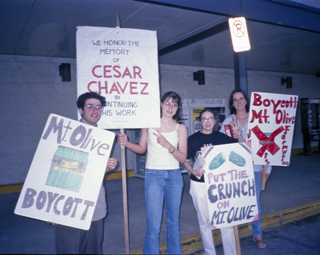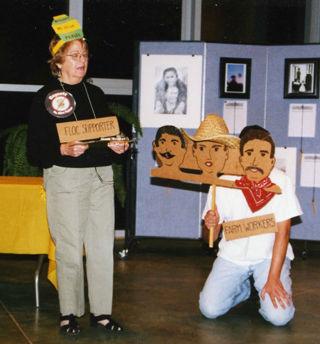Pickle Boycott - Farmworker Rights Action
A year long boycott of Mount Olive Pickles by the Farm Labor Organizing Committee began in 1999. One local leader, Joan Priess, led this effort at a local Kroger Grocery. Donning a pickle tiara she founded the Triangle Friends of United Farm Workers and mentored many young activists.
“Don’t spend a nickel on a Mount Olive pickle!”
“Justice for farmworkers!”
“Hasta la Victoria!”
“Just because the label says ‘k’ doesn’t mean they’re kosher.”
The yellow and green jars of Mt. Olive pickles are a familiar site in most grocery stores. But in 1999, these protest chants became the battle cries of a five-year nation wide boycott against the Mt. Olive Pickle Company. Joan Priess, clad in her “pickle tiara” led this effort at the Kroger Grocery on Hillsborough Road in Durham.
The pickle boycott was launched after the Farm Labor Organizing Committee (FLOC) discovered the corporate exploitation and deplorable conditions that migrant farm workers in eastern North Carolina were facing. The workers labored in dangerous circumstances, were denied access to healthcare or education and faced poor hourly wages. To make matters worse, the cucumber pickers had no means of organizing for their rights.
Joan Preiss quickly emerged as a force to be reckoned with. She founded the Triangle Friends of United Farm Workers organization and mentored young activists. Protester Ed King recalled Preiss’ legendary pickle tiara as a handcrafted tower of green construction paper bearing the words “Boycott Mt. Olive Pickles.” To both Durham authorities and Kroger customers, Preiss became known as the “Iron Lady of the Picket Line.” She and others convinced more than five hundred customers to fill out comment cards urging Kroger to stop selling the boycotted pickles.
Over time, the boycott evolved into a diverse and united effort. Everyday consumers, neighborhood activists, Duke students, and members of the Latino community. They used a variety of strategies such as speaking engagements, human billboarding, fiesta dinners, and street theater performances to raise awareness about the boycott.
In September of 2004, Mt. Olive finally relented, raising the price it paid for farm products by 2.25 percent. The cucumber pickers gained improved working conditions and governmental protections. And for the first time in the United States, guest agricultural workers had successfully unionized. After five years of pickets and protests, migrant farm workers were no longer in such a pickle.
Sources:
Student Action with Farmworkers Exhibit

